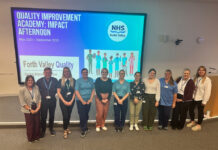To mark the first anniversary of the introduction of our new Speak Up service, we asked local Speak Up Ambassadors Pauline Donnelly and Dr Catherine Maclean to share their experiences of the last year and provide some hints and tips for local staff.
Reflecting on the last year
In January 2022, we launched the Speak Up service and our role as Speak Up Ambassadors and Confidential Contacts for Whistleblowing. The environment we work is changing, bringing new concerns and highlighting existing concerns. The most important thing that all of us can do is to listen with a desire to understand.
We support staff from across NHS Forth Valley to raise concerns and also have a broader role in understanding and developing the Speak Up culture locally. Speak Up Week in October 2022, allowed us to hear the experience of hundreds of staff and we are immensely grateful for the warm welcome we received across the sites.
Hints and tips
Our confidential support starts when someone is thinking about raising a concern, with a safe space to talk things through. We can also help before, during and after raising a concern. Wherever you might be in that journey, we are here for you.
Evidence shows that raising a concern is difficult. People often worry that nothing will change or that they will be victimised for speaking up. Receiving a concern is also difficult and it is human nature to jump into defence mode.
If someone brings you a new concern, you may both care deeply about the issue, but see things differently. A defensive response may quieten the concern, but it will persist. By welcoming the concern and seeking a shared understanding, we can learn from it and help deliver safer care.
How can we be better at receiving concerns?
Listen Up
- Thank the person for bringing the concern
- Listen then reflect – check if they feel understood
- Ask how they are feeling and if they need support
- Consider the Whistleblowing Standards
- Agree what your next steps will be
- Feedback – once agreed plan is complete, check if they feel the concern has been addressed fully
Whistleblowing Standards
- The national standards set out how NHS services must respond when a worker raises a concern, in the public interest, about an NHS service
- All workers (including students, volunteers and contractors) should be aware of the standards
- Supervisors and managers should know when to offer the standards and how to get local support
- There are TURAS modules for all staff and for managers – search “whistleblowing”
- If you or one of your staff have any questions, training needs or suggestions, contact either:
- Confidential Contacts: fv.confidentialcontact@nhs.scot
Whistleblowing Liaison Officer: fv.whistleblowing@nhs.scot
- Confidential Contacts: fv.confidentialcontact@nhs.scot
The road ahead
We encourage anyone with concerns to get in touch. We can arrange a confidential meeting in person, on MS Teams or by phone.
We also want to engage with teams- sharing information about the support we offer, listening to your experiences and hearing about local projects to support people to Speak Up.
Feedback, contacts and more information
If you have further suggestions or feedback, just get in touch. We are here to help.
- Email fv.speakup@nhs.scot or call 07815 478 117
- Visit the Speak Up website.
- Visit the Whistleblowing website.









